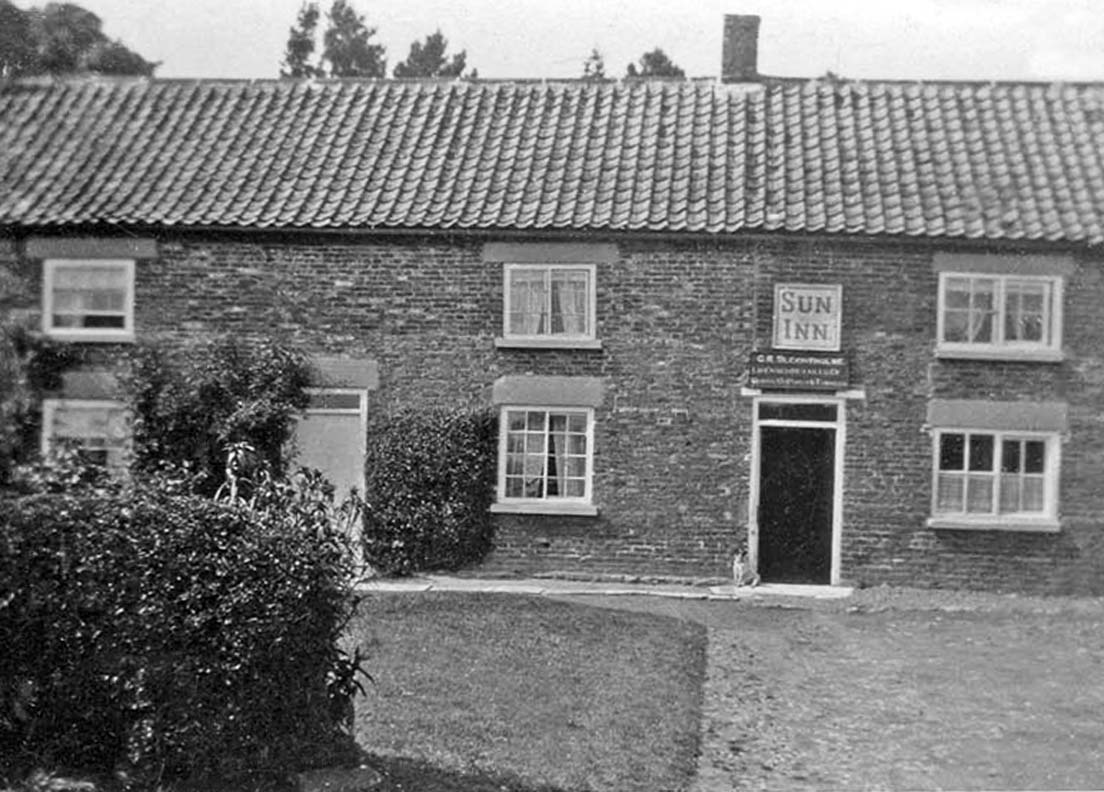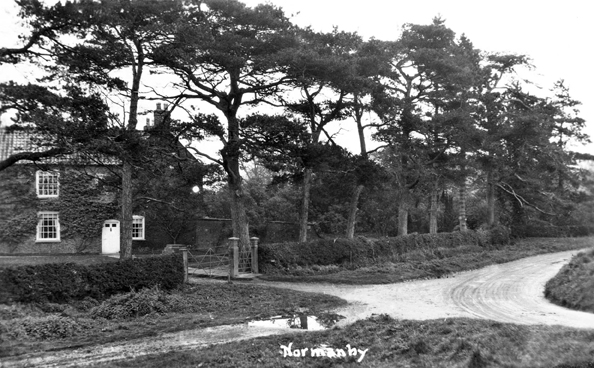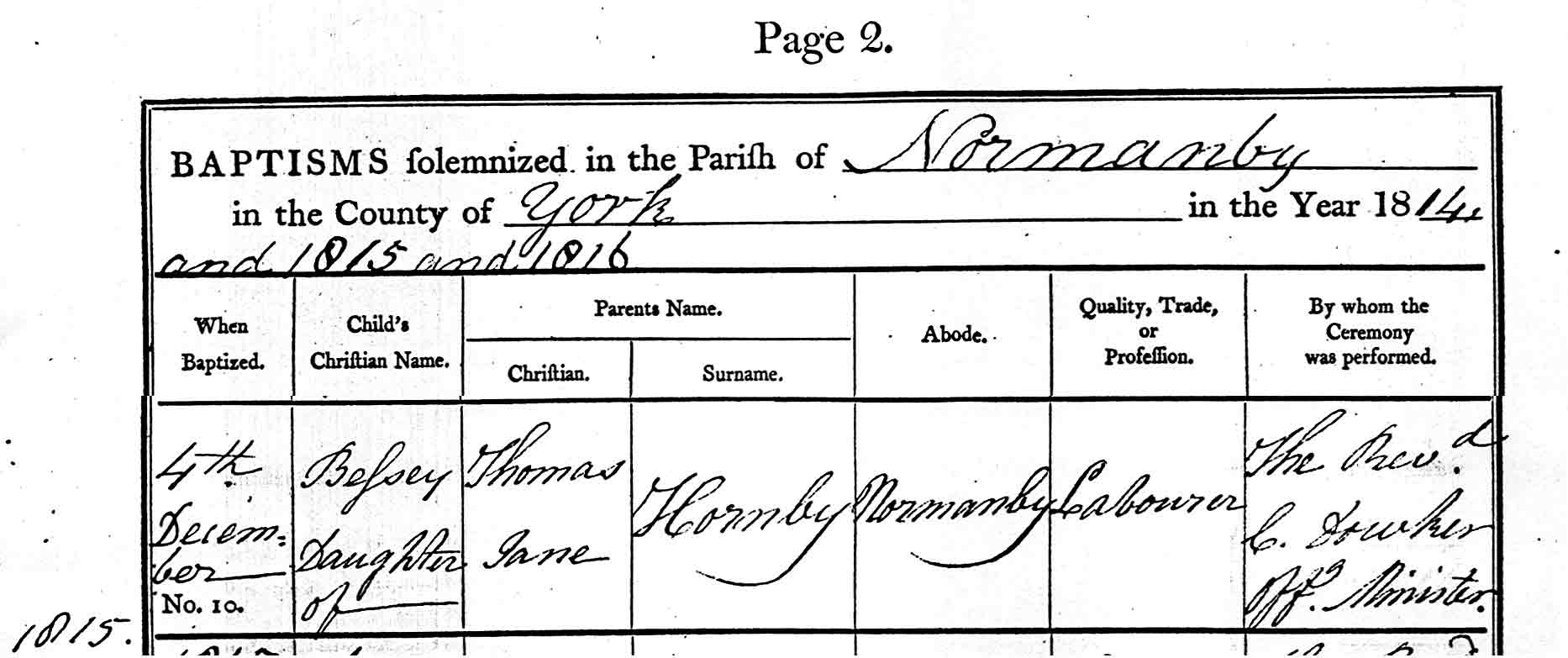1800 AD
In 1800
the Drainage Act was passed. This led to the straightening of rivers and
the draining of wetlands for agriculture. The first
detailed census of population took place in 1801.

The Sun Inn was built around this time
From 1813
all the baptism, marriage and burial registers were required to be kept in a
new standard bound format, by order of act of parliament. This makes
them much easier to read. They continued in this format until new
regulations in 1992. The occupations in the village were much the same as the
previous century. William Brocklebank was a
shepherd. Charles Stocks, however, mentioned in 1858, was a sailor.
We have access to tithe records for 1839, including a map made for the survey.
It shows a building down the old green lane by the Dickinson's house occupied
by a Matt Clarkson. At that time wheat was 7 shillings and a farthing
per bushel (7/0¼d), barley 3 shillings and eleven pence
ha' penny (3/11½d) and oats 2 shillings and 9 pence (2/9d).
In 1831 a
lad called
Joseph Smith (1823-1898) came to Bridge farm with his father, a
farmer, commissioner of taxes and preacher.

Bridge Farm (House) c.1900
Joseph Smith's father
commented that religion in Normanby was 'but
little known and practised'. He attended
Normanby
Day school but was sent home by the schoolmaster after a disagreement on how
to spell the word 'develop'! Joseph was in the right but he was sent to
Bramley near Leeds. This was a fair journey
in those days as there was still no railway. The trip was by coach.
At sixteen he returned home and became president of the Sunday school.
A
stonemason and dialect poet called John Castillo was repairing Bridge farm and
Joseph's father would set him to record
'awd
Issac' and other gems while Castillo paced around
the kitchen of an evening, dictating. John Castillo was unable to write
himself. The verses were later published.
In 1846 Joseph's father
placed him on the farm at Riseborough, where he
remained for thirty years. Here his own children grew up and enjoyed the
spaciousness of the old hall and its elevated position with views of the
Wolds and
moors. Joseph Smith had a way with words and became a local preacher in
1846. He was popular in the circuit as he was also a farmer. There
were about 52 local preachers and 2 ministers in the 'Pickering Plan'.
One
address Joseph Smith gave was at Normanby on 21st
of September 1849 when cholera was devastating the country. He said that
the cholera was 'the voice of the Almighty against the sins of the nation'.
At the time farming was in depression which Joseph partly blamed on incautious
investments by farmers in the new railway companies. He talked against
free trade and cheap foreign imports. His father died in 1849 some time
after he was thrown from a gig at Normanby.
In 1861 his brother
emigrated to South Africa, leaving Joseph to take
over the tenancy of Bridge farm. Including Riseborough,
this made 600 acres under his management. In 1869 his eldest son died of
gastric fever and was buried in Normanby.
The handsome gravestone by the church's east window tells us he was aged 15.
In February 1865 Joseph
chaired a meeting to promote the Leeds and North Yorkshire railway.
Later, in 1869, when the owner took over Bridge Farm, Joseph Smith moved his
family from Riseborough to farm at
Huggate in the
Wolds.
He kept the tenancy of Riseborough, leaving the
farm in the care of his faithful servant, Thomas Dodds.
By 1872 farming fortunes were back and a farm horse could command a price of
£100.
Small pox hit
the village in 1872. William Dennis died. In Joseph Smith's
memoirs, written by his son, mention is made of the heightening of the River
Seven banks in the 1890s.
In1883
Joseph moved to farm at South Holme, near
Slingsby. Here he was untiring in his work
for the Kirkbymoorside and Pickering circuits,
travelling many miles by the sometimes uncomfortable transport of the day.
He was buried in Slingsby in 1898.
The
Victorian village had its own improvement society and show. The society
was founded in 1854. Joseph Smith helped to promote the first Ryedale
show which was held in Kirkbymoorside in 1855.
The coming of the railway a cart ride away at Sinnington
by 1875 must have opened new horizons.
The 1851 Census
The census
records are a mine of information on what was happening in the village.
There were 177 people recorded.
The families in the village were:
|
1851 Census |
|
Year-2000 |
|
AGAR |
HESELTINE |
Atkinson |
Knight |
|
AINSLEY |
HILL |
Bell |
Lane |
|
ALLISON |
HORNBY |
Belt |
Lund |
|
ATKINSON |
HUDDLESTONE |
Blythe |
Marquis |
|
BENIMAN |
HUMBLE |
Booth |
Marton |
|
BODDY |
HUNTON |
Brown |
McClaren |
|
BOYES |
JACKSON |
Cairncross |
McLean |
|
CHAPMAN |
LANCASTER |
Camp |
Murphy |
|
CLARKSON |
LUMLEY |
Chambers |
Nicoll-Griffith |
|
CLEMMIT |
MASSHEDOR |
Coote |
North |
|
COATES |
NEWBY |
Crummack |
Ordidge |
|
DALE |
RAWLING |
Davis |
Ray |
|
DAVISON |
ROBINSON |
De Rouffignac
Harrison |
Roberts |
|
DENNEY |
SCOTT |
Dean |
Sanders |
|
DINNIS |
SEAMER |
Dickinson |
Shail |
|
DINSLEY |
SANDERSON |
Dowell |
Skilbeck |
|
DODDS |
SIMPSON |
Dunce |
Sleightholme |
|
DOWSON |
SKELTON |
Frank |
Smith |
|
DUFFIELD |
SMITH |
Hardeman |
Sturdy |
|
FLETCHER |
STOCKIL |
Heaton |
Tate |
|
FOSTER |
STONEHOUSE |
Hine |
Wallis |
|
GIBSON |
STRICKLAND |
Hornby |
Walsh |
|
GILL |
TAYLOR |
Kavanagh |
Wood |
|
GOODRICK |
THOMPSON |
Keeper |
Knight` |
|
GREEN |
TINDALL |
|
|
HARLAND |
TROWSDALE |
|
HARRISON |
WARD |
|
HAWKINS |
WAWNE |
|
HELM |
WILSON |
|
AGAR |
HESELTINE |
Four
names,
Atkinson, Harrison, Hornby and Smith are in
both lists. However, only
Harrison and
Hornby
are believed to have village connections with both
Censuses.

Top